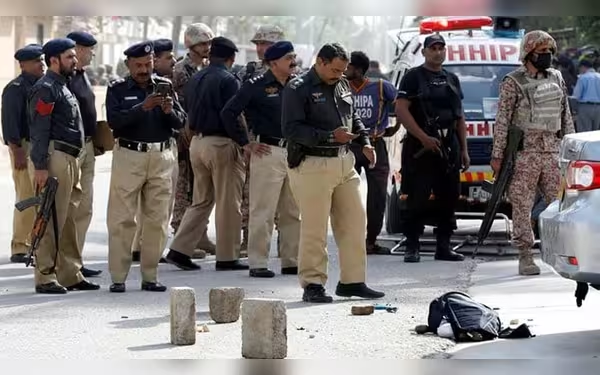Saturday, November 16, 2024 05:57 PM
Mob Rule Crisis in Pakistan: A Call for Justice
- Mob violence undermines state authority and justice.
- Recent blasphemy incidents highlight societal fanaticism.
- Victims of mob justice face no protection from law.
 Image Credits: geo
Image Credits: geoThe rise of mob rule in Pakistan raises concerns over justice and state authority amid blasphemy incidents.
The rise of mob rule in Pakistan has become a pressing concern, particularly in the context of religious fervor. This troubling trend raises questions about the state’s ability—or willingness—to maintain order and uphold the law. While the government seems quick to suppress political dissent, it appears to falter when faced with the chaotic demands of mobs driven by religious zeal. This duality in the state’s response is alarming and highlights a significant issue within the fabric of Pakistani society.
Recently, a tragic incident in Umerkot exemplified this disturbing reality. A doctor was accused of posting blasphemous content on social media, leading to a swift and violent reaction from the community. Following his alleged extrajudicial killing by police, a mob pursued his body, ultimately setting it ablaze. This horrific act not only underscores the mob's power but also reflects the state’s impotence in protecting its citizens from such violence.
In a shocking display of complicity, police officials were seen receiving garlands and praise from clerics for their role in the doctor’s death. This incident is not isolated; it mirrors a broader pattern where law enforcement appears to align with mob sentiments rather than uphold justice. Just last week, another blasphemy suspect was killed in a police station in Quetta, further illustrating the troubling collaboration between authorities and extremist factions.
The implications of these events are profound. They reveal a society where fear and fanaticism overshadow reason and justice. For instance, a teacher in Bannu was coerced into denouncing scientific theories in favor of religious dogma, showcasing how deeply entrenched these beliefs are within educational institutions. Such incidents raise critical questions about the values being instilled in future generations.
Moreover, the case of a woman in Lahore, who was accused of blasphemy for wearing a shirt with Arabic calligraphy, highlights the absurdity of mob justice. Despite being the victim, she was forced to apologize, while the mob faced no repercussions for their threats. This scenario illustrates a troubling trend where the victim is blamed, and the aggressors are emboldened.
The history of violence linked to blasphemy accusations in Pakistan is long and tragic. It reflects a society grappling with its identity and values. As citizens, it is crucial to reflect on what these events say about us and the direction in which we are heading. The challenge lies not only in addressing the immediate threats posed by mob rule but also in fostering a culture of tolerance, understanding, and respect for the law.
The rise of mob rule in Pakistan is a complex issue that demands urgent attention. It is essential for the state to reclaim its authority and ensure that justice prevails over chaos. Only then can we hope to build a society where reason triumphs over fanaticism, and every individual is protected under the law, regardless of the accusations they face.













